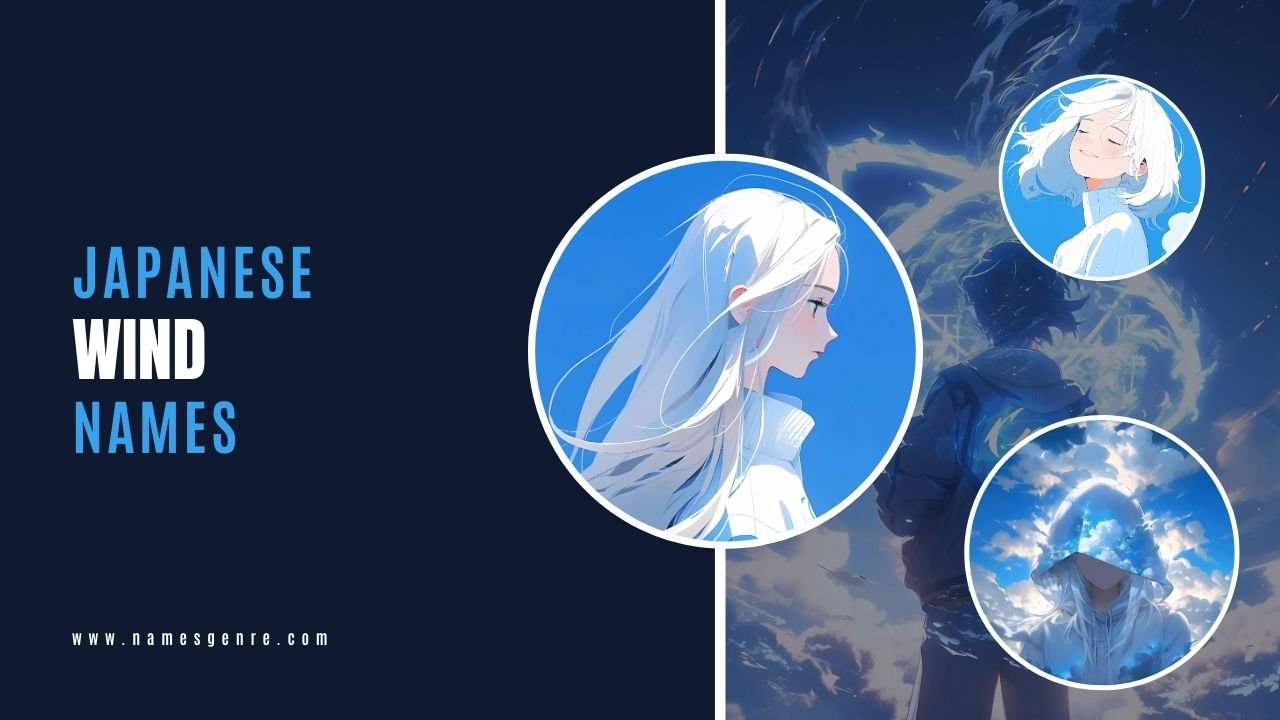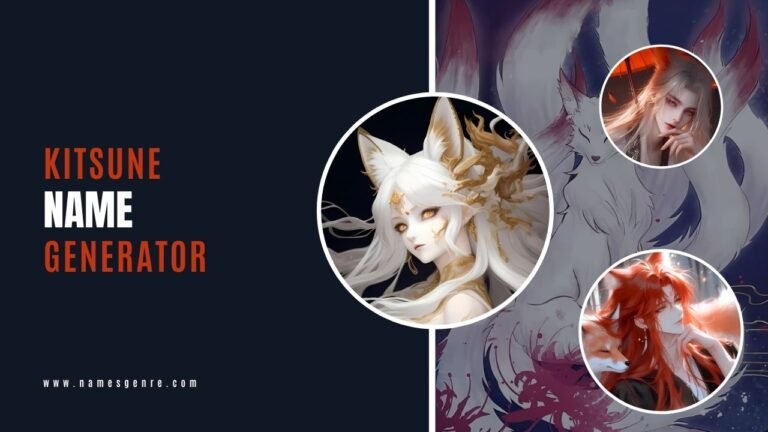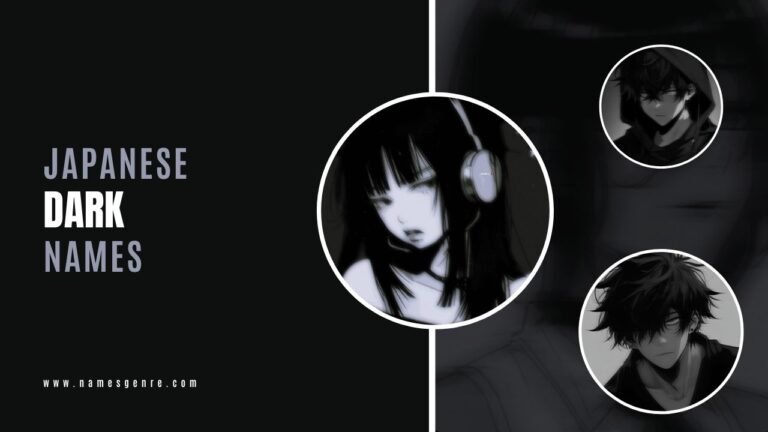A meaningful name can say a lot more about you than you can even imagine. It can give others an idea of what kind of person you are and the personality you might have, even without knowing each other personally or seeing each other for the first time.
This is one of the reasons why Japanese people choose names for themselves and for their newborns so carefully as it holds a significant role in their daily life. Generally, a large part of Japanese people prefer element-themed names, as these names not only hold the qualities of the element but also offer spiritual support in their own way.
For example, in this article, I’m going to share some of the best Japanese names that means ‘wind’ as they capture the soul of nature’s gentle force and the spirit of freedom. Additionally, wind symbolizes many other positive qualities that I could mention, but to avoid making it boring, I’ll provide all that information at the end of this article for you to read peacefully.
In case, if you want to jump straight to the best Japanese names that means ‘wind,’ then keep reading!
Japanese names meaning wind boy

Now, there can always be people who prefer names dedicated solely to boys, as wind-themed names for boys often convey power, agility, and resilience. Besides this, they also capture the untamed and spirited aspects of the wind—qualities traditionally admired in male names.
Wind names can also express some kind of mystery and strength, suggesting someone who is both calm and formidable, and able to face life’s challenges with grace.
Kazuhiko (風彦)
- Kanji: 風 (wind) + 彦 (boy)
- Meaning: “Boy of the wind”
- Pronunciation: Kah-zoo-hee-koh
Kazehiro (風弘)
- Kanji: 風 (wind) + 弘 (vast)
- Meaning: “Vast wind”
- Pronunciation: Kah-zeh-hee-roh
Fūya (風也)
- Kanji: 風 (wind) + 也 (also)
- Meaning: “Also wind”
- Pronunciation: Foo-yah
Kazuki (風樹)
- Kanji: 風 (wind) + 樹 (tree)
- Meaning: “Wind tree”
- Pronunciation: Kah-zoo-kee
Fūsuke (風介)
- Kanji: 風 (wind) + 介 (mediate)
- Meaning: “Mediator of the wind”
- Pronunciation: Foo-soo-keh
Kazeo (風雄)
- Kanji: 風 (wind) + 雄 (heroic)
- Meaning: “Heroic wind”
- Pronunciation: Kah-zeh-oh
Kazutora (風虎)
- Kanji: 風 (wind) + 虎 (tiger)
- Meaning: “Wind tiger”
- Pronunciation: Kah-zoo-toh-rah
Kazuto (風翔)
- Kanji: 風 (wind) + 翔 (soar)
- Meaning: “Soaring wind”
- Pronunciation: Kah-zoo-toh
Kazuma (風真)
- Kanji: 風 (wind) + 真 (true)
- Meaning: “True wind”
- Pronunciation: Kah-zoo-mah
Kazushi (風志)
- Kanji: 風 (wind) + 志 (will)
- Meaning: “Will of the wind”
- Pronunciation: Kah-zoo-shee
Kazuki (風季)
- Kanji: 風 (wind) + 季 (season)
- Meaning: “Seasonal wind”
- Pronunciation: Kah-zoo-kee
Fūsei (風聖)
- Kanji: 風 (wind) + 聖 (sacred)
- Meaning: “Sacred wind”
- Pronunciation: Foo-seh-ee
Kazuhide (風秀)
- Kanji: 風 (wind) + 秀 (excellent)
- Meaning: “Excellent wind”
- Pronunciation: Kah-zoo-hee-deh
Kazuki (風輝)
- Kanji: 風 (wind) + 輝 (shine)
- Meaning: “Shining wind”
- Pronunciation: Kah-zoo-kee
Kazunari (風成)
- Kanji: 風 (wind) + 成 (achievement)
- Meaning: “Achieving wind”
- Pronunciation: Kah-zoo-nah-ree
Kazuharu (風晴)
- Kanji: 風 (wind) + 晴 (clear sky)
- Meaning: “Clear wind”
- Pronunciation: Kah-zoo-hah-roo
Kazuki (風樹)
- Kanji: 風 (wind) + 樹 (tree)
- Meaning: “Wind tree”
- Pronunciation: Kah-zoo-kee
Fūtarō (風太郎)
- Kanji: 風 (wind) + 太郎 (eldest son)
- Meaning: “Wind’s eldest son”
- Pronunciation: Foo-tah-roh
Kazuyuki (風雪)
- Kanji: 風 (wind) + 雪 (snow)
- Meaning: “Wind and snow”
- Pronunciation: Kah-zoo-yoo-kee
Kazuhito (風人)
- Kanji: 風 (wind) + 人 (person)
- Meaning: “Wind person”
- Pronunciation: Kah-zoo-hee-toh
Kazuo (風生)
- Kanji: 風 (wind) + 生 (life)
- Meaning: “Life of the wind”
- Pronunciation: Kah-zoo-oh
Kazutaka (風高)
- Kanji: 風 (wind) + 高 (tall)
- Meaning: “High wind”
- Pronunciation: Kah-zoo-tah-kah
Kazunobu (風信)
- Kanji: 風 (wind) + 信 (trust)
- Meaning: “Trusted wind”
- Pronunciation: Kah-zoo-noh-boo
Kazuto (風翔)
- Kanji: 風 (wind) + 翔 (soar)
- Meaning: “Soaring wind”
- Pronunciation: Kah-zoo-toh
Kazufumi (風文)
- Kanji: 風 (wind) + 文 (culture)
- Meaning: “Cultural wind”
- Pronunciation: Kah-zoo-foo-mee
Kazuyoshi (風義)
- Kanji: 風 (wind) + 義 (justice)
- Meaning: “Just wind”
- Pronunciation: Kah-zoo-yoh-shee
Kazunao (風直)
- Kanji: 風 (wind) + 直 (honesty)
- Meaning: “Honest wind”
- Pronunciation: Kah-zoo-nah-oh
Kazutoshi (風利)
- Kanji: 風 (wind) + 利 (advantage)
- Meaning: “Beneficial wind”
- Pronunciation: Kah-zoo-toh-shee
Kazutaro (風太郎)
- Kanji: 風 (wind) + 太郎 (eldest son)
- Meaning: “Eldest wind son”
- Pronunciation: Kah-zoo-tah-roh
Kazumitsu (風満)
- Kanji: 風 (wind) + 満 (full)
- Meaning: “Full wind”
- Pronunciation: Kah-zoo-mee-tsoo
Kazuharu (風遥)
- Kanji: 風 (wind) + 遥 (distant)
- Meaning: “Distant wind”
- Pronunciation: Kah-zoo-hah-roo
Kazutomo (風友)
- Kanji: 風 (wind) + 友 (friend)
- Meaning: “Friendly wind”
- Pronunciation: Kah-zoo-toh-moh
Kazuhisa (風久)
- Kanji: 風 (wind) + 久 (long time)
- Meaning: “Enduring wind”
- Pronunciation: Kah-zoo-hee-sah
Kazunori (風憲)
- Kanji: 風 (wind) + 憲 (law)
- Meaning: “Wind and law”
- Pronunciation: Kah-zoo-noh-ree
Kazuyasu (風康)
- Kanji: 風 (wind) + 康 (health)
- Meaning: “Healthy wind”
- Pronunciation: Kah-zoo-yah-soo
Japanese names meaning wind girl

Unlike boys’ names, wind-themed names for girls often represent gentleness, elegance, freedom, and lightness. They also reflect a different sense of strength where, no matter how soft someone may seem on the outside they have an inner strength that can endure any kind of life’s challenges.
Moreover, this balance between gentleness and strength makes these names an appealing choice for girls who want a name that feels ethereal, timeless, and deeply connected to the natural world.
Kazuko (風子)
- Kanji: 風 (wind) + 子 (child)
- Meaning: “Child of the wind”
- Pronunciation: Kah-zoo-koh
Kazumi (風美)
- Kanji: 風 (wind) + 美 (beauty)
- Meaning: “Beautiful wind”
- Pronunciation: Kah-zoo-mee
Kazue (風恵)
- Kanji: 風 (wind) + 恵 (blessing)
- Meaning: “Blessing of the wind”
- Pronunciation: Kah-zoo-eh
Fūna (風奈)
- Kanji: 風 (wind) + 奈 (beautiful)
- Meaning: “Graceful wind”
- Pronunciation: Foo-nah
Kazuna (風菜)
- Kanji: 風 (wind) + 菜 (greens)
- Meaning: “Wind and greens”
- Pronunciation: Kah-zoo-nah
Kazuri (風里)
- Kanji: 風 (wind) + 里 (village)
- Meaning: “Wind village”
- Pronunciation: Kah-zoo-ree
Kazusa (風砂)
- Kanji: 風 (wind) + 砂 (sand)
- Meaning: “Wind and sand”
- Pronunciation: Kah-zoo-sah
Kazuyo (風世)
- Kanji: 風 (wind) + 世 (world)
- Meaning: “World of the wind”
- Pronunciation: Kah-zoo-yoh
Kazura (風良)
- Kanji: 風 (wind) + 良 (good)
- Meaning: “Good wind”
- Pronunciation: Kah-zoo-rah
Fūri (風理)
- Kanji: 風 (wind) + 理 (logic)
- Meaning: “Logic of the wind”
- Pronunciation: Foo-ree
Kazue (風英)
- Kanji: 風 (wind) + 英 (hero)
- Meaning: “Heroic wind”
- Pronunciation: Kah-zoo-eh
Kazuka (風香)
- Kanji: 風 (wind) + 香 (fragrance)
- Meaning: “Fragrant wind”
- Pronunciation: Kah-zoo-kah
Kazuyo (風葉)
- Kanji: 風 (wind) + 葉 (leaf)
- Meaning: “Leaf in the wind”
- Pronunciation: Kah-zoo-yoh
Kazunae (風苗)
- Kanji: 風 (wind) + 苗 (seedling)
- Meaning: “Seedling of the wind”
- Pronunciation: Kah-zoo-nah-eh
Kazune (風寧)
- Kanji: 風 (wind) + 寧 (tranquility)
- Meaning: “Tranquil wind”
- Pronunciation: Kah-zoo-neh
Kazuhime (風姫)
- Kanji: 風 (wind) + 姫 (princess)
- Meaning: “Princess of the wind”
- Pronunciation: Kah-zoo-hee-meh
Kazumi (風海)
- Kanji: 風 (wind) + 海 (sea)
- Meaning: “Wind over the sea”
- Pronunciation: Kah-zoo-mee
Kazuno (風乃)
- Kanji: 風 (wind) + 乃 (of)
- Meaning: “Of the wind”
- Pronunciation: Kah-zoo-noh
Kazue (風咲)
- Kanji: 風 (wind) + 咲 (blossom)
- Meaning: “Blossoming wind”
- Pronunciation: Kah-zoo-eh
Kazuka (風夏)
- Kanji: 風 (wind) + 夏 (summer)
- Meaning: “Summer wind”
- Pronunciation: Kah-zoo-kah
Kazuhana (風羽)
- Kanji: 風 (wind) + 羽 (feather)
- Meaning: “Feather of the wind”
- Pronunciation: Kah-zoo-hah-nah
Kazune (風音)
- Kanji: 風 (wind) + 音 (sound)
- Meaning: “Sound of the wind”
- Pronunciation: Kah-zoo-neh
Kazura (風空)
- Kanji: 風 (wind) + 空 (sky)
- Meaning: “Sky wind”
- Pronunciation: Kah-zoo-rah
Kazuna (風波)
- Kanji: 風 (wind) + 波 (wave)
- Meaning: “Wave of the wind”
- Pronunciation: Kah-zoo-nah
Fūri (風莉)
- Kanji: 風 (wind) + 莉 (jasmine)
- Meaning: “Jasmine wind”
- Pronunciation: Foo-ree
Kazusa (風陽)
- Kanji: 風 (wind) + 陽 (sun)
- Meaning: “Sunny wind”
- Pronunciation: Kah-zoo-sah
Kazue (風愛)
- Kanji: 風 (wind) + 愛 (love)
- Meaning: “Love of the wind”
- Pronunciation: Kah-zoo-eh
Kazuhana (風良美)
- Kanji: 風 (wind) + 良 (good) + 美 (beauty)
- Meaning: “Beautiful, good wind”
- Pronunciation: Kah-zoo-hah-nah
Fūnae (風苗)
- Kanji: 風 (wind) + 苗 (seedling)
- Meaning: “Seedling of the wind”
- Pronunciation: Foo-nah-eh
Kazuno (風乃葉)
- Kanji: 風 (wind) + 乃葉 (of the leaf)
- Meaning: “Wind of the leaf”
- Pronunciation: Kah-zoo-noh
Kazuka (風桜)
- Kanji: 風 (wind) + 桜 (cherry blossom)
- Meaning: “Cherry blossom wind”
- Pronunciation: Kah-zoo-kah
Kazuna (風瞳)
- Kanji: 風 (wind) + 瞳 (eye)
- Meaning: “Wind of the eyes”
- Pronunciation: Kah-zoo-nah
Kazuhime (風姫良)
- Kanji: 風 (wind) + 姫 (princess) + 良 (good)
- Meaning: “Good princess of the wind”
- Pronunciation: Kah-zoo-hee-meh
Kazue (風祈)
- Kanji: 風 (wind) + 祈 (prayer)
- Meaning: “Prayer of the wind”
- Pronunciation: Kah-zoo-eh
Kazuyo (風陽美)
- Kanji: 風 (wind) + 陽 (sun) + 美 (beauty)
- Meaning: “Beautiful sunny wind”
- Pronunciation: Kah-zoo-yoh
Best Japanese Unisex names meaning wind
If you prefer unisex names or are looking for a name that embodies both masculine and feminine qualities, unisex names are a great choice. This is likely one of the reasons why people nowadays prefer wind-related unisex names, as they seek names that represent the fluidity and adaptability of the element itself.
As these names are unisex, they can signify a sense of independence and neutrality, embodying a balanced strength that appeals to many modern families. In today’s world, these names can also reflect the idea of not being bound by traditional gender roles, allowing the person who bears the name to grow and evolve freely, just like the wind.
Fūka (風華)
- Kanji: 風 (wind) + 華 (flower)
- Meaning: “Wind flower”
- Pronunciation: Foo-kah
Kazuki (風希)
- Kanji: 風 (wind) + 希 (hope)
- Meaning: “Wind of hope”
- Pronunciation: Kah-zoo-kee
Fūmi (風美)
- Kanji: 風 (wind) + 美 (beauty)
- Meaning: “Beautiful wind”
- Pronunciation: Foo-mee
Kazeha (風羽)
- Kanji: 風 (wind) + 羽 (feather)
- Meaning: “Wind feather”
- Pronunciation: Kah-zeh-hah
Fūka (風夏)
- Kanji: 風 (wind) + 夏 (summer)
- Meaning: “Summer wind”
- Pronunciation: Foo-kah
Kazune (風音)
- Kanji: 風 (wind) + 音 (sound)
- Meaning: “Sound of the wind”
- Pronunciation: Kah-zoo-neh
Fūto (風翔)
- Kanji: 風 (wind) + 翔 (fly)
- Meaning: “Flying wind”
- Pronunciation: Foo-toh
Fūsai (風彩)
- Kanji: 風 (wind) + 彩 (color)
- Meaning: “Colorful wind”
- Pronunciation: Foo-sigh
Kazura (風良)
- Kanji: 風 (wind) + 良 (good)
- Meaning: “Good wind”
- Pronunciation: Kah-zoo-rah
Fūri (風里)
- Kanji: 風 (wind) + 里 (village)
- Meaning: “Wind of the village”
- Pronunciation: Foo-ree
Kazumi (風美)
- Kanji: 風 (wind) + 美 (beauty)
- Meaning: “Beautiful wind”
- Pronunciation: Kah-zoo-mee
Kazuna (風奈)
- Kanji: 風 (wind) + 奈 (apple tree)
- Meaning: “Wind and apple tree”
- Pronunciation: Kah-zoo-nah
Fūran (風蘭)
- Kanji: 風 (wind) + 蘭 (orchid)
- Meaning: “Wind orchid”
- Pronunciation: Foo-rahn
Fūyo (風陽)
- Kanji: 風 (wind) + 陽 (sun)
- Meaning: “Sunny wind”
- Pronunciation: Foo-yoh
Kazuto (風翔)
- Kanji: 風 (wind) + 翔 (soar)
- Meaning: “Soaring wind”
- Pronunciation: Kah-zoo-toh
Kazora (風空)
- Kanji: 風 (wind) + 空 (sky)
- Meaning: “Wind of the sky”
- Pronunciation: Kah-zoh-rah
Fūko (風子)
- Kanji: 風 (wind) + 子 (child)
- Meaning: “Child of the wind”
- Pronunciation: Foo-koh
Kazuki (風月)
- Kanji: 風 (wind) + 月 (moon)
- Meaning: “Wind and moon”
- Pronunciation: Kah-zoo-kee
Fūsei (風星)
- Kanji: 風 (wind) + 星 (star)
- Meaning: “Wind and star”
- Pronunciation: Foo-seh
Kazuna (風南)
- Kanji: 風 (wind) + 南 (south)
- Meaning: “South wind”
- Pronunciation: Kah-zoo-nah
Fūran (風嵐)
- Kanji: 風 (wind) + 嵐 (storm)
- Meaning: “Wind storm”
- Pronunciation: Foo-rahn
Kazora (風薫)
- Kanji: 風 (wind) + 薫 (fragrance)
- Meaning: “Fragrant wind”
- Pronunciation: Kah-zoh-rah
Kazusa (風砂)
- Kanji: 風 (wind) + 砂 (sand)
- Meaning: “Wind and sand”
- Pronunciation: Kah-zoo-sah
Fūka (風佳)
- Kanji: 風 (wind) + 佳 (excellent)
- Meaning: “Excellent wind”
- Pronunciation: Foo-kah
Kazumi (風光)
- Kanji: 風 (wind) + 光 (light)
- Meaning: “Wind and light”
- Pronunciation: Kah-zoo-mee
Fūna (風名)
- Kanji: 風 (wind) + 名 (name)
- Meaning: “Famous wind”
- Pronunciation: Foo-nah
Kazura (風羅)
- Kanji: 風 (wind) + 羅 (net)
- Meaning: “Entwining wind”
- Pronunciation: Kah-zoo-rah
Fūri (風璃)
- Kanji: 風 (wind) + 璃 (glass)
- Meaning: “Crystal wind”
- Pronunciation: Foo-ree
Kazue (風恵)
- Kanji: 風 (wind) + 恵 (blessing)
- Meaning: “Blessed wind”
- Pronunciation: Kah-zoo-eh
Fūyo (風陽)
- Kanji: 風 (wind) + 陽 (sunshine)
- Meaning: “Sunlit wind”
- Pronunciation: Foo-yoh
Kazuki (風生)
- Kanji: 風 (wind) + 生 (life)
- Meaning: “Living wind”
- Pronunciation: Kah-zoo-kee
Kazune (風清)
- Kanji: 風 (wind) + 清 (clear)
- Meaning: “Clear wind”
- Pronunciation: Kah-zoo-neh
Kazuki (風木)
- Kanji: 風 (wind) + 木 (tree)
- Meaning: “Wind and tree”
- Pronunciation: Kah-zoo-kee
Fūren (風蓮)
- Kanji: 風 (wind) + 蓮 (lotus)
- Meaning: “Lotus wind”
- Pronunciation: Foo-rehn
Kazuna (風那)
- Kanji: 風 (wind) + 那 (calm)
- Meaning: “Calm wind”
- Pronunciation: Kah-zoo-nah
Significance of Japanese Names Meaning Wind
Japanese names that mean ‘wind’ often carry deep meaning and significant symbolism, representing freedom, resilience, and a strong connection to nature. Like water, wind shares some similarities, such as the ability to adapt to anything. Moreover, a wind-themed name can also reflect a balance of strength and gentleness.
These types of names are also very rich in cultural associations which are generally linked to deities and spirits. Their versatility allows them to transcend traditional gender norms, making them appealing to a wide range of people and reflecting today’s values of inclusivity. Ultimately, wind-inspired names serve as reminders of hope and change, encouraging individuals to embrace life’s journey with optimism and grace.
Why Choose a Wind-Related Name?
If you’re wondering why you should choose a wind-themed name, then let me turn the question around: why not choose a wind-themed name? After all, in Japanese culture wind and names related to it often carry meanings like movement, adaptability, and strength. Along with these qualities, they also embody a sense of freedom and the ability to navigate life with resilience, much like the wind that weaves through landscapes and weather patterns.
This is also one of the reasons why choosing a wind-inspired name for a child or a character can be meaningful. Also based on the principles of Japanese philosophy, the concept of wind symbolizes a connection to nature, reminding us of the harmony between humans and the environment.





